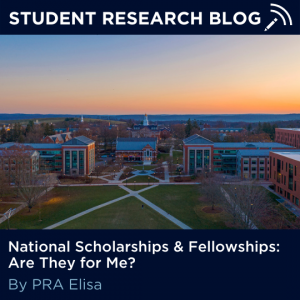Interview by Elisa Shaholli, Peer Research Ambassador
National Scholarships & Fellowships
Part 1: Are They for Me?
A Conversation with Dr. Vin Moscardelli, Director of UConn’s Office of National Scholarships and Fellowships (ONSF)
Can you tell us about the Office of National Scholarships & Fellowships?
We are the office that works with students competing for nationally competitive awards. Some of these are awards people may have heard of like the Rhodes, Fulbright, Truman, or Marshall. If you’re a scientist you may have heard of the NSF Graduate Research Fellowship or the Churchill. Most of these are for graduate study. People are applying to go abroad or to pursue graduate degrees.
We spend a lot of time working with students on application essays. We read essays, provide feedback, and work with students to try to get a sense of what the future holds for them and what the best path forward might be. The conversation tends to focus on the best path for you and the best opportunity for you. The fit is a really important part of this. It’s meant to be a learning process. What we do is try to help students think clearly about what they want to do and why.
What’s the biggest misperception people have about national scholarships and this office specifically?
There’s a misperception that we only work with honors students. We are not a part of Honors; we are a part of Enrichment Programs. We are available to students of any major across any of the campuses and any level. We work with medical students, law students, graduate students and undergrads of all disciplines and even alumni. We are working with everyone.
As for the scholarships, there’s no reason to think that one has to have a 4.0 or 3.98 to be competitive for some really neat opportunities. A lot of these are about fit. What are the things you’ve been interested in academically, socially? There may be opportunities to further explore what you’re deeply interested in.
Some programs are very holistic and some are very narrow. Some are evaluating a very narrow slice of who you are. Often they are looking for folks who aren’t that well rounded. I joke they are looking for misshapen people, people who have something they care really deeply about and who have focused a lot of their efforts on that area to the point where they maybe even moved the needle in some way on the problems they care about, or in the research they do, or in the creative and design realm in which they are working. There are so many cool things academically and extracurricularly in this university where people have chances to make a difference in things they care deeply about. So, if you feel like you’re not that well rounded, well I don’t see a whole lot of Rhodes or Marshalls rolling down the hill. They bump. They bounce. Because they aren’t well rounded. They have things they care deeply about, they are misshapen, and they are great at some things and not so great at others, so don’t let the tendency to focus on what you are not discourage you either.
Looking at the website has advantages such as looking at the folks nominated before. Students can have a sense of what were the profiles of who was competitive for these awards in the past which can be helpful. In the resources page we also have search engines. There’s no one single list of all the scholarship and fellowships opportunities out there. I encourage people to look in many of them, not just one.
What recommendations do you have for students who are interested in these scholarships but may feel nervous or are afraid to apply?
I encourage students to go to the ONSF website, search the site based on things you may be interested in, and complete the intake form. You are not committing to anything, but I think the act of doing the search and making the appointment makes it real. So much about our future we put off so this is a big step. Sometimes the best way to start the conversation is to have it with one of us, but also looking around, getting a sense of what’s out there, and having a couple of opportunities you are interested in as a way of framing our conversation is an important part of this. I encourage people to reach out, do a little bit of research, and schedule a meeting with one of us in the office because this gets you going on this pathway.
Check out the next steps outlined in this special 2-part blog:
Elisa is a junior majoring in Economics with minors in English and Global Studies. Click here to learn more about Elisa.